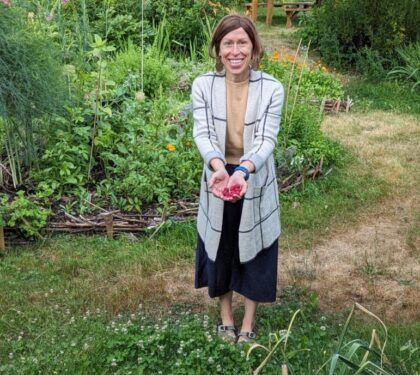On June 16, 10am – 4pm, AFT and regional partners will launch our first learning circle for women ranchers in northeastern Oregon. Learning Circles are a place where women in agriculture gather to hear from each other. A collaboration between AFT’s Women for the Land Initiative and our Pacific Northwest Regional Program, this project focuses on the power of community in building resilience within a changing climate.
Partners for this project include 6 Ranch, Northeast Oregon Economic Development Department, Quivira Coalition, Oregon Climate and Agriculture Network, and the USDA’s Climate Hub. Funding for this project comes from USDA’s Natural Resource Conservation Services, Patagonia’s Environmental Grant Program, Tillamook, and the Roundhouse Foundation.
Liza Jane McAlister and Adele Schott of 6 Ranch in Enterprise, OR are excited to host the first WFL learning circle. Nestled in the Wallowa Valley, the lands their family has called home for six generations are a mix of flat, grassy fields, and mixed conifers, with the Wallowa mountains as a backdrop. 6 Ranch runs their operation “to preserve and protect the natural balance between the living land and the life it sustains.”
Schott expands on this balance:
“We use horses, dogs, and fences to manage our cattle, and we use our cattle to manage our grass and our water. We use the grass and the water to provide a healthy ecosystem not only for ourselves but for the wildlife, bugs, the birds, the fish, and all the things that are all connected. And it’s this cycle of nature that we do our best to facilitate.”
It’s this lived experience and intimate knowledge of the land that ranchers like Adele, her mother and business partner Liza Jane, and others involved in this project will share as they build an intentional community with other ranchers in NE Oregon.
This corner of Oregon can be a challenging place to ranch. The weather shifts dramatically and climate-related issues such as drought and fire are becoming more common. For ranchers like McAlister and Schott, resilience is a part of their long-term strategy for keeping their business viable. McAlister described their preventive approach as one that ultimately makes their land more successful:
We look at resilience like the old saying, ‘An ounce of prevention is like a pound of cure.’ We prepare for the worst and take advantage of the best. In addition, we’ve found we can be more balanced and successful utilizing multiple opportunities from the land simultaneously – food production, recreation, and conservation. This approach gives us broad diversity in our operations with multiple uses and markets which allows us to be stronger, more adaptable, and flexible for the long term.
6 Ranch’s main income stream is grass-finished beef direct marketed to restaurants, grocery stores, and subscribers. They have an on-site farm store where they sell their honey, produce, beef, and eggs direct to customers, and offer guided fly-fishing. In addition, their Corrientes are sought after rodeo cattle, providing another income stream for the operation. Through this diversified business model, 6 Ranch ensures that they can weather unexpected setbacks.
The 2021 drought that impacted the western United States did not have much of an impact on 6 Ranch. But McAlister calls attention to the potential impact for other regional producers:
These impacts haven’t really hurt our operation, but I am really worried about other small producers. I’m afraid we’re going to see a lot of people forced to fold up their tents. There is also a lot of pressure for more recreation, more housing and we are losing agricultural food producing land at an insane rate. Living in such a beautiful place, these pressures are real.
Schott and McAlister’s experience as well as their deep commitment to their community make 6 Ranch the ideal place from which to launch this project, with the learning circle model as a forum for participants to build relationships. McAlister recounts how having a strong community has bolstered her spirits throughout her time working the land:
When I remember what helped me most over the years, when I remember what is missing for so many women working the land producing food on their own or with their partner and family, it’s an opportunity to get together intentionally, to learn from each other and support each other… I know how important it is because my daughter has been that person to me.
While ‘Advancing Climate Resiliency Among Women Ranchers in Northeastern Oregon’ is a new project, AFT has long had ties to this region, having held a conservation easement on a 2,100-acre ranch in Wallowa County since 1982. We see this project as another opportunity to highlight and support conservation projects that reflect local community values.
Interested ranchers can register.
For more information, contact Chantel Welch, Pacific Northwest Project Manager ([email protected]).
This blog post was a collaboration between Liza Jane McAlister of 6 Ranch, Ashley Rood of Oregon Climate and Agriculture Network (OrCAN), and Chantel Welch of American Farmland Trust.




